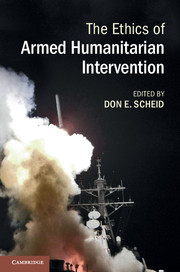Book contents
- Frontmatter
- Contents
- Notes on contributors
- Preface and acknowledgments
- List of abbreviations and acronyms
- Part I Intervention and debate
- Part II Moral perspectives
- Part III Ideas and reconsiderations
- 8 The costs of war
- 9 Armed humanitarian intervention and the problem of abuse after Libya
- 10 The responsibility to protect and the problem of regime change
- 11 Law, ethics, and the responsibility to protect
- 12 Responsibility to protect and the language of crimes
- 13 Post-intervention
- 14 Rethinking responsibility to protect
- Select bibliography
- Index
- References
8 - The costs of war
Justice, liability, and the Pottery Barn rule
Published online by Cambridge University Press: 05 June 2014
- Frontmatter
- Contents
- Notes on contributors
- Preface and acknowledgments
- List of abbreviations and acronyms
- Part I Intervention and debate
- Part II Moral perspectives
- Part III Ideas and reconsiderations
- 8 The costs of war
- 9 Armed humanitarian intervention and the problem of abuse after Libya
- 10 The responsibility to protect and the problem of regime change
- 11 Law, ethics, and the responsibility to protect
- 12 Responsibility to protect and the language of crimes
- 13 Post-intervention
- 14 Rethinking responsibility to protect
- Select bibliography
- Index
- References
Summary
By the time they were in Bush’s office, Powell was on a roll.
“You are going to be the proud owner of 25 million people,” he told the president. “You will own all their hopes, aspirations, and problems. You’ll own it all.” Privately, Powell and Armitrage called this the Pottery Barn rule: You break it, you own it.
Recent years have seen a surge in philosophical writing and thinking about jus post bellum – justice after warfare’s end. Just as a war entered into for morally sufficient reasons (jus ad bellum) may be made wrongful if conducted badly (jus in bello), so may a war entered into and conducted well be made wrongful if ended poorly. If, for instance, the people whose interests are nominally the justification for the war are left to suffer indignity or injustice, we are right to think that the entire course of the war is best regarded as morally disreputable. The increased attention given to these ideas is due to facts both inside and outside the world of academia. We are right, of course, to think that the idea of jus post bellum is an important addition to the philosophical literature; the fact that it has become recognized as such, though, is largely attributable to the aftermath of the US invasion of Iraq, in which the importance of a good ending has been brought home to us in a particularly stark way.
This fact means, of course, that the philosophical debate about justice has not been the only debate to be found. Ideas of justice in warfare have been increasingly prevalent during the past decade of war. Colin Powell’s invocation of the Pottery Barn rule has proven to be a resilient symbol of one particular vision of justice in the ending of war. The idea is that the one who invades a country thereby obtains responsibility for that country: The one who breaks it, in other words, must be the one to fix it. On this vision, a country might – even if its cause and conduct were just – become an unjust aggressor after the fact, by refusing to provide adequate assistance after war.
- Type
- Chapter
- Information
- The Ethics of Armed Humanitarian Intervention , pp. 133 - 147Publisher: Cambridge University PressPrint publication year: 2014
References
- 2
- Cited by

